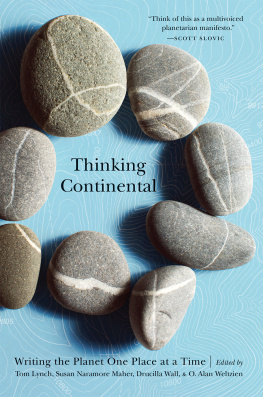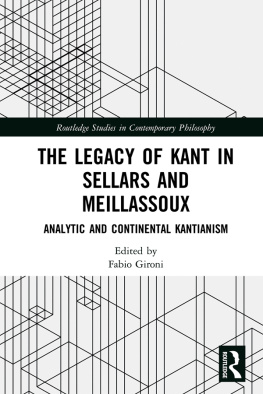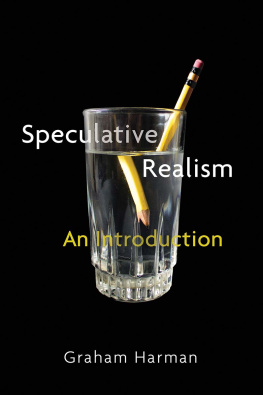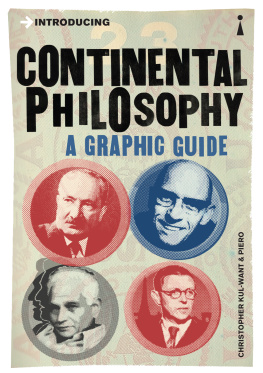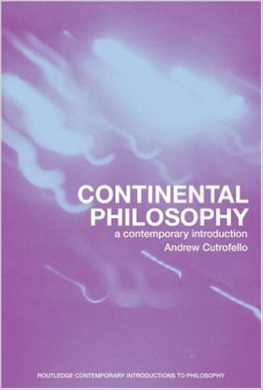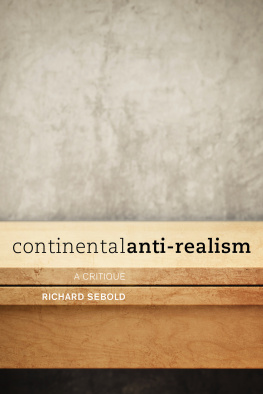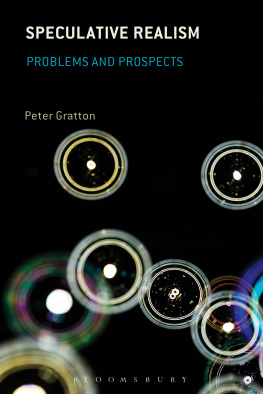Footnotes
Preface: The Hermeneutics of the Real
1. Maurice Merleau-Ponty, Phenomenology of Perception trans: Colin Smith (London: Routledge, 2005), xi.
2. Bruno Latour, Reassembling the Social: An Introduction toActor-Network-Theory (Oxford, Oxford University Press, 2005), 245.
3. Lee Braver, A Thing of This World: A History of ContinentalAnti-Realism (USA: Northwestern University Press, 2007), 79.
1.1 The Ancestral Realm
4. Quentin Meillassoux, Aprs la finitude: essai sur la ncessit dela contingence (Paris: Seuil, 2006) translated as Quentin Meillassoux, After Finitude: An Essay on the Necessity ofContingency trans. Ray Brassier (London: Continuum, 2008). Hereafter cited as AF referring to the English translation. I will also be referencing a short introductory paper introducing the central ideas of After Finitude called Time without Becoming. http://speculativeheresy.files.wordpress.com/2008/07/3729-time_without_becoming.pdf. This paper was delivered at the Centre for Research in Modern European Philosophy, Middlesex University in May, 2008.Hereafter cited as TWB. It is worth noting that Meillassoux belongs to the group of thinkers known as the speculative realists. My claim that this new path will replace the transcendental method does not refer to speculative realism per se, but rather to the broader post-continental trend with its roots in the anti-phenomenological thought of Gilles Deleuze and Alain Badiou. The speculative realists are Quentin Meillassoux, Ray Brassier, Graham Harman, and Iain Hamilton Grant. The label has been heavily critiqued in recent years most notably by its inventor Ray Brassier who notes that: There is no speculative realist doctrine common to the four of us: the only thing that unites us is antipathy to what Quentin Meillassoux calls correlationismthe doctrine, especially prevalent among Continental philosophers, that humans and world cannot be conceived in isolation from one othera correlationist is any philosopher who insists that the human-world correlate is philosophys sole legitimate concern. Brassier makes this claim in an interview with Bram Ieven for the Dutch magazine nY Transitzone: Against an Aesthetics of Noise: http://www.ny-web.be/transitzone/against-aesthetics-noise.html
5. See Charles R. Bambach, Heidegger, Dilthey, and the Crisis ofHistoricism (Ithaca and London: Cornell University Press, 1995) and Tom Rockmore, Heidegger, German Idealism & Neo-Kantianism (Amherst, NY: Humanity Books, 2000).
6. Slavoj iek , Organs without Bodies: On Deleuze andConsequences (New York: Routledge, 2004), 44.
7. Meillassoux recognises that despite the label correlationist positions are ...extraordinarily varied in themselves (TWB, 1).
8. Meillassoux does include analytic philosophy under correlationism in After Finitude (AF, 7), but he never provides a complimentary critique of analytic philosophy to mirror the critique of continental correlationism.
9. One might be inclined to state that not all continental antirealists have givenness as their theme, but Meillassouxs critique is important precisely in that it reveals that, whether it is explicit or not, givenness remains a fundamental commitment of any continental antirealism. In my reading Meillassoux is truly out to critique transcendentalism, or the transcendental method, but he deploys the label correlationist to broaden the potential targets of his critique. According to Peter Gratton Meillassouxs speculative realism is dismissive of an entire tradition in post-Kantian French and German phenomenology (Husserl, Sartre, Merleau-Ponty, etc.) and post-phenomenology (Lacan, Derrida, Deleuze, Foucault, etc.). Peter Gratton, After the Subject: Meillassouxs Ontology of What May Be, Pli: The WarwickJournal of Philosophy 20 (2009), 60.
10. Meillassoux concludes the first chapter of After Finitude with the following important proviso: ...we should state right away that it is not our aim here to resolve this problem; only to try provide a rigorous formulation of it, and to do so in such a way that its resolution no longer seems utterly inconceivable to us (AF, 26).
11. Meillassoux makes it clear that this distinction is the driving force behind his later development of the principle of factiality: Through this thesis [the principle of factiality], I try to reveal the condition for the thinkability of the fundamental opposition in correlationism, even when this opposition is neither stated nor denied: this is the opposition of the in-itself and the for-us (TWB, 9).
12. Meillassoux explains Kants position as follows: From this point on, intersubjectivity, the consensus of a community, supplants the adequation between the representations of a solitary subject and the thing itself as the veritable criterion of objectivity, and of scientific objectivity more particularly. Scientific truth is no longer what conforms to an in-itself supposedly indifferent to the way in which it is given to the subject, but rather what is susceptible of being given as shared by a scientific community (AF, 4-5, his italics).
13. Ray Brassier helpfully glosses the meaning of the correlationist circle: Correlationism is subtle: it never denies that our thoughts or utterances aim at or intend mind-independent or language-independent realities; it merely stipulates that this apparently independent dimension remains internally related to thought and reality. Ray Brassier, Nihil Unbound: Enlightenmentand Extinction (London: Palgrave Macmillan, 2007), 51.
14. Meillassoux describes how these techniques work as follows: These techniques generally rely upon the constant rate of disintegration of radioactive nuclei, as well as upon the laws of thermoluminescence the latter permitting the application of dating techniques to the light emitted from stars (AF, 9).
15. It is put more concisely in Time without Becoming: ...I ask if correlationism in any of its versions is able to give a sense or a meaning to ancestral statements (TWB, 3). It is worth comparing this to the question put to transcendental phenome-nologists by the early phenomenological realist Josef Seifert: ...is human knowledge confined to an immanent sphere of human consciousness and to a world of objects ( noemata) which derive all their meaning and being from human subjectivity, from mans being in the world, from his transcendental, or even his historical consciousness? in Josef Seifert, Back to the ThingsThemselves (New York, London: Routledge and Kegan Paul, 1987), 2.
16. This is a subtle example of the correlationist circle: Correlationism rests an argument as simple as it is powerful, which can be formulated as follows: there can be no X without a givenness of X, and no theory of X without a positing of X. If you speak about something, the correlationist will say, you speak about something that is given to you, and posited by you (TWB, 1).
17. This is the correlationists affirmation of the two levels ofmeaning (AF, 14, his italics).
18. It is worth noting, as Gratton does, that science has, in its own way, developed its realist dogma: ...Meillassoux is also clear that scientists, for their part, operate from a realist dogmatism that takes for granted that the arche-fossil, the evidence of ancestral events prior to living beings, points without mediation to the in-itself of reality, a realism that Husserl for his part called the natural attitude. Peter Gratton, After the Subject: Meillassouxs Ontology of What May Be, Pli: The Warwick Journal of Philosophy 20 (2009), 61.
1.2 The Correlationist Nexus



